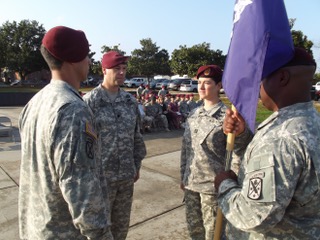Nicole’s Story
“As a U.S. Army Civil Affairs officer, I apply my knowledge of governance and civil-military relations to support the requirements of the governance officials and military commanders in the country I’m deployed. I first met Colonel Peter Hebert in 2011 while I was deployed to a small village in the mountainous border region between Afghanistan and Pakistan.
I was on my first Special Operations deployment and COL Hebert was the 1st Cavalry Division’s G9 (Civil- Military Operations chief) and was about to become my commanding officer. I stopped by to meet COL Hebert during a short trip to Bagram Airfield and found him welcoming, interested in team operations, and most importantly, willing to make the time to see me. I immediately had a good feeling about my future boss.
When I returned to Ft. Bragg, NC after completing my deployment, COL Hebert had taken command of the unit. I learned almost immediately that he had selected me to serve in the prestigious position of Headquarters and Headquarters Company commander, a position reserved for high-performers are responsible for the training and welfare of the largest and most diverse company in the unit. There was a strong pool of candidates to choose from so his selection of me was a vote of confidence and strongly influenced my development as an Army officer.
Shortly after I took command, the Syrian Crisis was making headlines and COL Hebert charged me with developing training scenarios and planning exercises to prepare the staff for the impending humanitarian crisis. COL Hebert instilled confidence and gave me the mentorship I needed to educate and train the staff even though I was a junior officer. About a month later, another male ally of mine (Major Virgil Dwyer) requested that I go to Turkey on a first-of-its-kind mission for special operations in the Syrian Crisis. COL Hebert quickly identified another officer who would help me manage the daily operations of the company at Ft. Bragg so that I could take advantage of the opportunity to deploy. His advocacy and efforts allowed me to serve my soldiers at Ft. Bragg while accomplishing a critical mission from Turkey without relinquishing my command position prematurely, an action that may have negatively impacted by future promotions.
As I’ve spent the last few years reflecting on the role and characteristics of allies, mentors and sponsors, I have always looked to my own experiences with COL Hebert as a great example of how positive male allyship and mentorship can be a catalyst for young women leaders like myself. There are many of my women peers who credit COL Hebert’s actions and character as the reason why they are still in the military today. Additionally, his wife Peggy has been extremely supportive and motivating as she continues to champion for women in leadership.
I’ve recently completed another command assignment, this time for 27 months that included two six-month deployments to Europe, and will become the Operations Officer for my battalion in August. Without COL Hebert’s mentorship and allyship during the two years he was my commander and the years afterwards, I wouldn’t have had the opportunities to become the leader that I am today.”
Pete’s Story
“A quick word about why I care about women in leadership, specifically women in military leadership: it’s pretty straightforward really – I care about women in leadership for same reason I care about anyone in leadership. Our soldiers deserve to be led by the best. Combat and other high-stakes special operations missions are a crucible; character and ability are sifted without respect to whether one is male or female. The young men and women who are risking their lives deserve leaders they can trust, who can draw out of them more than they ever expected, and who will give them the best chance of returning home victorious. Such leaders come in the form of both exceptional men and exceptional women.
Nicole Alexander is such a leader, and stood out even among her very talented peers in the special operations community. My first impression of her was that she was a true warrior. While in Afghanistan, Nicole and her team took part in a particularly difficult operation. I spoke with the soldiers on her team, and the Green Berets beside whom she’d fought. Every one of them were superlative in their praise of Nicole’s bravery and leadership. It was clear they all wanted her with them the next time they went into a fight.
Upon returning to Fort Bragg, and over the next few months, it became clear that Nicole was a multi-dimensional leader; innovative, creative, passionate, and with a vision for the organization and the soldiers she led. She took an interest in the personal and professional well-being of each individual in her unit. She inspired, encouraged, built – even when disciplining. She excelled at finding solutions to complex issues, often in missions at the highest levels of US government presence abroad. Nicole clearly had the characteristics of a future senior leader, so we needed to ensure her career path and experience would not only continue to benefit her soldiers, but would give her the best chances for personal development, promotion, and senior command. We gave her company command early, ensured she had multiple deployments (a must for promotion in a war-time Army), and nominated her for the Commanding General’s personal mentorship program.
Not surprisingly, she excelled at each opportunity, and continues doing so today after another command and multiple deployments. Through it all, she is constantly ‘paying it forward’ — investing in her soldiers, in other women leaders, and in her unit, inspiring and building, and most importantly in our business: winning.”


My daughter has established high goals for herself but has demonstrated and has honed and demonstrated her leadership skills in multiple assignments (2Iraq/2Afghanistan/2 Europe, plus stateside) She is the epitome of leadership. She has situational awareness, mission oriented, challenging trainng for soldiers, physically fit, yet always looks out for her sodiers and their families.
In my 22 years in the military I have seen good and bad leaders. I may be prejudiced but Nicole ranks in the top leaders I have served with or for.